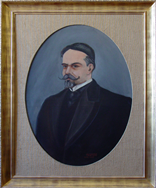U.Porto Memory
Grand Hall of the University of Porto - Portrait Gallery
| António José de Almeida Republican, founder of the University of Porto and President of the Republic Portrait by Otávio Sérgio (copy of photo) |
 |
||
Biography of António José de Almeida (1866-1929)
António José de Almeida, son of José António de Almeida, an industrialist and trader, and of Maria Rita das Neves Almeida, was born in Vale da Vinha, Penacova, on 17 July 1866.
He completed high school in Liceu Central, Coimbra, in 1885, and enrolled in the faculties of Mathematics and Philosophy (1885-1889) and Medicine (1889-1895). In 1894, he completed his undergraduate course and received the Barão de Castelo de Paiva award, an honour given to outstanding students. In the following year, he graduated and was again honoured for his academic performance and approved unanimously with a final mark of Good (15 out of 20) in Medical Practice and Surgery. However, he was unable to teach, an episode in his life which prompted him to write about it in the book "Desaffronta (História d'uma perseguição)".
António José de Almeida lived through the English Ultimatum and the final phase of the monarchy. As a staunch supporter of the Republican movement, he attacked King D. Carlos in an article published in the academic newspaper of Coimbra ("Bragança, o último"), for which he went to jail for 3 months. On 13 November 1890, he signed the "Manifesto da Academia de Coimbra", which proclaimed Republican principles and initiated collaboration with the newspapers "O alarme" and "Azagaia", of the same political allegiance, and in 1893 was the main speaker at the funeral of the Republican teacher José Falcão.
In 1896, António José de Almeida left for S. Tomé e Príncipe. While in Africa, he practiced as a doctor, specializing in tropical dieseases, and promoted the Pró-pátria Association, set up to aid the repatriation of European settlers. He returned to Portugal in 1903 and later went on a study and leasure trip in Europe (France, Italy, Holland and Switzerland). He set up a practice in Lisbon in 1904 that earned him instant fame among the popular classes.
In the meantime, he became campaigning actively in the republican movement. In 1905 he spoke at the funeral of the artist and Republican Rafael Bordalo Pinheiro and ran, unsuccessfully, for the parliamentary elections for the Lisbon constituency, as a member of the Portuguese Republican Party (PRP). In the following year, he was elected to the PRP Board, and as a member of the Eastern Lisbon constituency. By this time, he wrote in the periodical "A Lucta" and his oratory skills were highly appreciated in Parliament and in rallies.
In 1907, António José de Almeida became a member of the Masonic lodge "Montanha", in Lisbon, adopting the symbolic name of Álvaro Vaz de Almada. He was also a member of Carbonaria. Years later, in early 1929, he was elected Grand Master of Freemasonry for the period 1929-1932, although he did not hold the post for health reasons.
António José de Almeida conspired against the João Franco dictatorship and participated in the movement to overthrow the monarchy. He was arrested and freed after the regicide. In 1908 he was elected Republican MP and in the Republican Congress of 1909 he was chosen to lead the civil wing of the Revolutionary Committee. He established and directed the magazine "Alma Nacional" and was one of the 14 Republican MPs chosen in the elections of 28 August. With the proclamation of the Republic on 5 October, he was appointed Minister of Home Affairs of the Provisional Government headed by Teófilo Braga. In this post, he contributed decisively to the implementation of important reforms, such as the Higher Normal Schools (21 March 1911), higher education, the establishment of the universities of Porto and Lisbon (1911) and the establishment of new curricula (22 March 1911). He had an important role in drafting the University Constitution of 19 April 1911 and in the reform of art education (26 May 1911).
In 1911 he also founded the newspaper "República" and in 1912 the Evolutionist Party. He advocated Portugal’s participation in the World War I, in an alliance with England, and supported Prime-Minister Pimenta de Castro in 1915. He reconciled with Afonso Costa in 1916 and headed the "União Sagrada" Government (1916-1917), where he was also the Minister of the Colonies.
He was elected President of the Republic in 1919, and Manuel Teixeira Gomes succeeded him in 1923. In 1925 he was elected MP for Lisbon and in the following year he received the title of "Honorary President" by the Military Dictatorship.
He married Maria Joana Morais Queiroga in 1910 and they had a daughter. He spent the last years of his life in a wheelchair as a result of a disease - gout. He died in Lisbon on 31 October 1929 and was buried in the cemetery of Alto de S. João.
In 1937, a monument by sculptor Leopoldo de Almeida and architect Pardal Monteiro was erected in Lisbon in honour of the only head of State of the 1st Republic that served 4 years in office.
Universidade Digital / Gestão de Informação, 2012. Scientific Review by Jorge Fernandes Alves (FLUP)
Last updated: 2016-07-07 Webpage created on: 2025-06-21 08:55:13 Complaint Portal